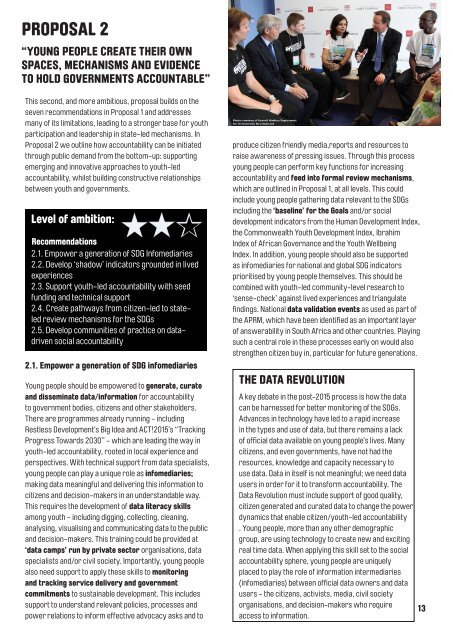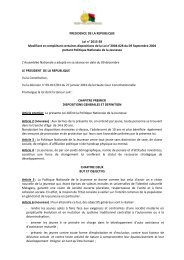FOLLOW-UP
follow-up-and-review-how-to-scale-up-ambition-on-youth-led-accountability-for-the-sdgs-pdf
follow-up-and-review-how-to-scale-up-ambition-on-youth-led-accountability-for-the-sdgs-pdf
Create successful ePaper yourself
Turn your PDF publications into a flip-book with our unique Google optimized e-Paper software.
PROPOSAL 2<br />
“YOUNG PEOPLE CREATE THEIR OWN<br />
SPACES, MECHANISMS AND EVIDENCE<br />
TO HOLD GOVERNMENTS ACCOUNTABLE”<br />
This second, and more ambitious, proposal builds on the<br />
seven recommendations in Proposal 1 and addresses<br />
many of its limitations, leading to a stronger base for youth<br />
participation and leadership in state-led mechanisms. In<br />
Proposal 2 we outline how accountability can be initiated<br />
through public demand from the bottom-up: supporting<br />
emerging and innovative approaches to youth-led<br />
accountability, whilst building constructive relationships<br />
between youth and governments.<br />
Level of ambition:<br />
Recommendations<br />
2.1. Empower a generation of SDG Infomediaries<br />
2.2. Develop ‘shadow’ indicators grounded in lived<br />
experiences<br />
2.3. Support youth-led accountability with seed<br />
funding and technical support<br />
2.4. Create pathways from citizen-led to stateled<br />
review mechanisms for the SDGs<br />
2.5. Develop communities of practice on datadriven<br />
social accountability<br />
2.1. Empower a generation of SDG infomediaries<br />
Young people should be empowered to generate, curate<br />
and disseminate data/information for accountability<br />
to government bodies, citizens and other stakeholders.<br />
There are programmes already running - including<br />
Restless Development’s Big Idea and ACT!2015’s “Tracking<br />
Progress Towards 2030” - which are leading the way in<br />
youth-led accountability, rooted in local experience and<br />
perspectives. With technical support from data specialists,<br />
young people can play a unique role as infomediaries;<br />
making data meaningful and delivering this information to<br />
citizens and decision-makers in an understandable way.<br />
This requires the development of data literacy skills<br />
among youth - including digging, collecting, cleaning,<br />
analysing, visualising and communicating data to the public<br />
and decision-makers. This training could be provided at<br />
‘data camps’ run by private sector organisations, data<br />
specialists and/or civil society. Importantly, young people<br />
also need support to apply these skills to monitoring<br />
and tracking service delivery and government<br />
commitments to sustainable development. This includes<br />
support to understand relevant policies, processes and<br />
power relations to inform effective advocacy asks and to<br />
produce citizen friendly media,reports and resources to<br />
raise awareness of pressing issues. Through this process<br />
young people can perform key functions for increasing<br />
accountability and feed into formal review mechanisms,<br />
which are outlined in Proposal 1, at all levels. This could<br />
include young people gathering data relevant to the SDGs<br />
including the ‘baseline’ for the Goals and/or social<br />
development indicators from the Human Development Index,<br />
the Commonwealth Youth Development Index, Ibrahim<br />
Index of African Governance and the Youth Wellbeing<br />
Index. In addition, young people should also be supported<br />
as infomediaries for national and global SDG indicators<br />
prioritised by young people themselves. This should be<br />
combined with youth-led community-level research to<br />
‘sense-check’ against lived experiences and triangulate<br />
findings. National data validation events as used as part of<br />
the APRM, which have been identified as an important layer<br />
of answerability in South Africa and other countries. Playing<br />
such a central role in these processes early on would also<br />
strengthen citizen buy in, particular for future generations.<br />
THE DATA REVOLUTION<br />
A key debate in the post-2015 process is how the data<br />
can be harnessed for better monitoring of the SDGs.<br />
Advances in technology have led to a rapid increase<br />
in the types and use of data, but there remains a lack<br />
of official data available on young people’s lives. Many<br />
citizens, and even governments, have not had the<br />
resources, knowledge and capacity necessary to<br />
use data. Data in itself is not meaningful; we need data<br />
users in order for it to transform accountability. The<br />
Data Revolution must include support of good quality,<br />
citizen generated and curated data to change the power<br />
dynamics that enable citizen/youth-led accountability<br />
. Young people, more than any other demographic<br />
group, are using technology to create new and exciting<br />
real time data. When applying this skill set to the social<br />
accountability sphere, young people are uniquely<br />
placed to play the role of information intermediaries<br />
(infomediaries) between official data owners and data<br />
users - the citizens, activists, media, civil society<br />
organisations, and decision-makers who require<br />
access to information.<br />
13



